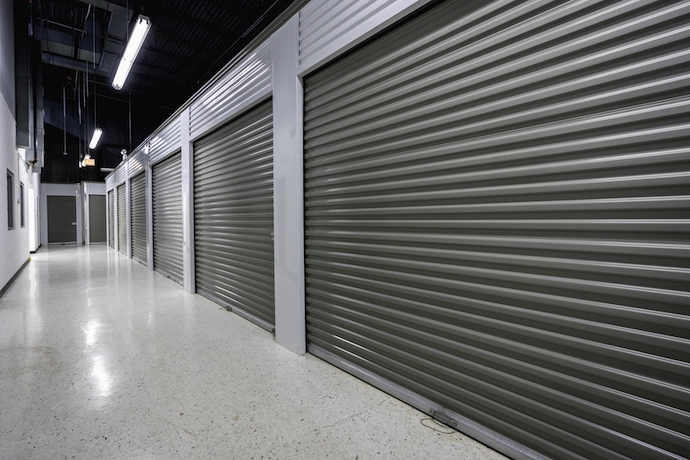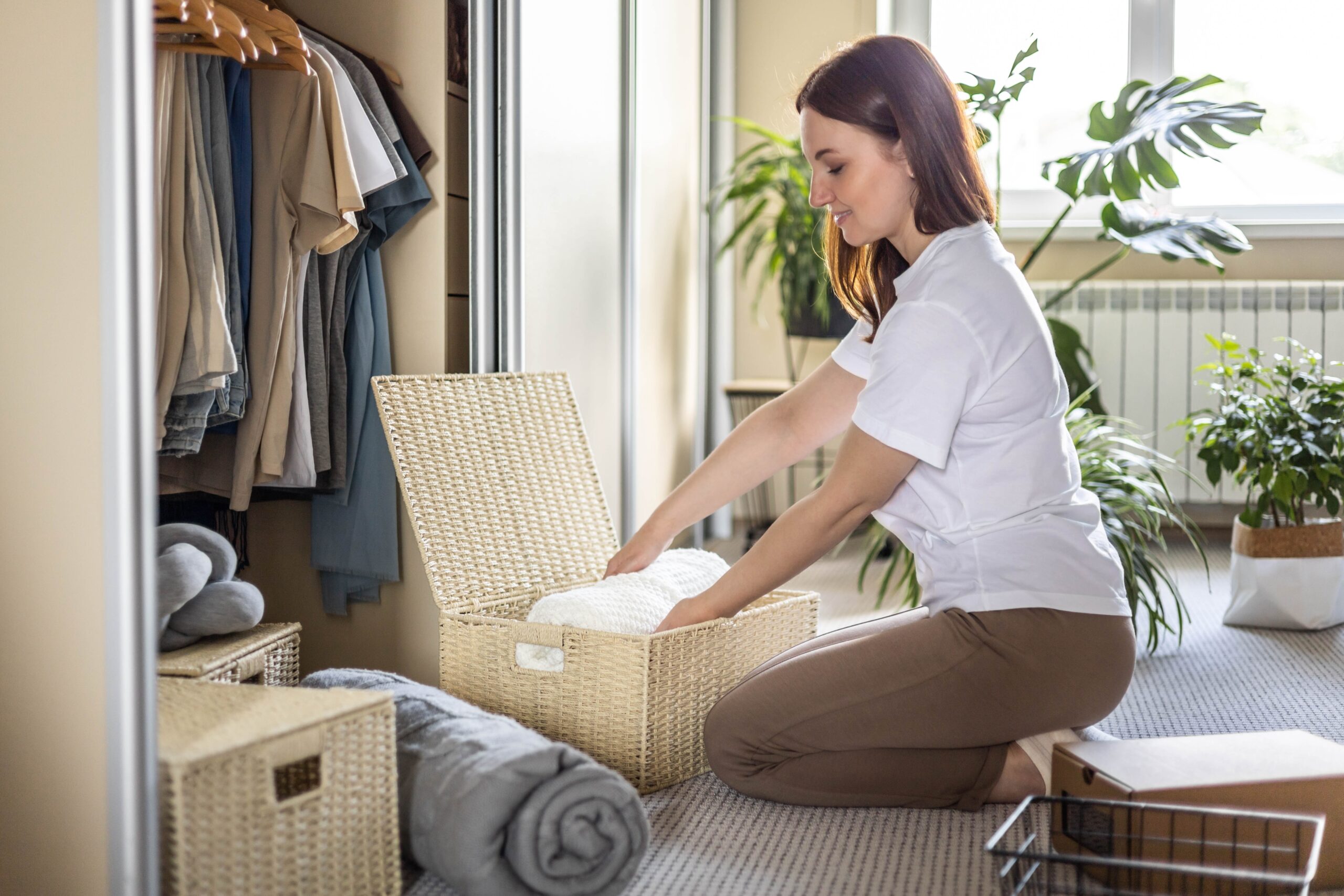Self-storage units come in all shapes and sizes, and different storage facilities offer different amenities to their customers. If you’re looking into renting a storage unit for any length of time, you may have noticed some facilities advertising “climate-controlled storage” or something similar. You may find yourself paying more for these units, but if they meet your needs, you’ll find them more than worth it in the long run.
In brief, a climate-controlled storage unit uses HVAC systems, humidifiers, and dehumidifiers to keep the space at a predictable range of temperature and humidity. Storage customers with valuable, fragile, or sensitive belongings can use these units to store their goods for a long time without worrying about moisture, heat, cold, or other environmental damage.
If you’d like to learn more about climate-controlled storage and how it might benefit you, keep reading! We’ll go over what these units do and don’t offer, what items need climate control to stay in good shape, and how to find the right unit for your needs.
What is climate-controlled storage?
A climate-controlled storage unit is a type of self-storage unit that is kept at a specific range of humidity and temperature at all times of the year, no matter what the external weather is like. Climate control uses an HVAC system to alternately heat and cool the unit, usually maintaining a temperature between 50 and 80 degrees Fahrenheit. In addition, it uses humidifiers and dehumidifiers to keep the unit’s humidity between 45% and 65%.
Any sort of delicate item, such as wood furniture or instruments, is prone to damage from extreme temperatures or sudden temperature changes. Wooden items in particular can warp when exposed to these environments. Metal items can also expand and contract in extreme temperatures, leading to damage. A constant temperature between 50 and 80 degrees will help minimize this damage.
Humidity, on the other hand, can lead to its own problems. Too much moisture in the air will allow mold and mildew to grow on surfaces, leading to bad smells at best and mold damage at worst. Little to no moisture can cause damage as well, making wood brittle and prone to breaking. Having a medium, controlled amount of humidity in the air will protect from these concerns.
The ranges we’ve mentioned here aren’t necessarily what every facility offers, however. Before choosing a climate-controlled unit, research and ask about the actual range of temperature and humidity the facility you’re looking at sets its systems to maintain.
Do I need climate control to store my items?
Several factors can influence your decision whether or not to use climate control. If you’re storing valuable items made of delicate materials like wood, such as an antique violin, a climate-controlled unit is perfect to keep them from being damaged. However, your environment plays into this choice as well; if you live in a particularly humid area, for example, a storage unit without humidity control almost guarantees mold and mildew will grow on anything you store. Properly cleaning and packing your items can help prevent this, but investing in a climate-controlled unit will go even further to keep moisture from collecting on your belongings.
Deciding whether or not to rent a climate-controlled unit also depends on how long you’re storing items. Shorter-term storage gives your items less time to have mold grow or temperatures damage them, but longer-term storage raises this risk for items of any material, so you may want to consider climate control if you’re storing anything for an extended period.
Erick Thorson, an independent agent with World Insurance in Arizona who specializes in insuring self-storage facilities, has seen several examples of families that opted out of climate control when storing sensitive items like art between moves. Even during these short periods, damage was done. For this reason, Thorson says it’s always best to choose climate-controlled storage for delicate items, regardless of the time you’re storing them.
What are the benefits of climate-controlled storage?
Any environmental damage an item might take from extreme temperatures or moisture can be prevented in a climate-controlled storage unit. High heat can cause documents and pictures to fade, while extreme cold can damage wood and cause moisture to puddle on objects. High humidity can lead to mildew, mold, and other water damage, while low humidity can cause wood and documents to become brittle and fall apart. A stable temperature and humidity in your storage unit minimizes the risk of any of this damage.
A secondary benefit of climate control is more advanced technology throughout the whole facility–from security cameras to biometric door locks, a storage facility with climate-controlled units is often a signifier of higher-end equipment.
What items require climate-controlled storage most of all?
Some of the more obvious and valuable belongings that should only be stored in climate-controlled units include:
- Artwork
- Musical instruments
- Vinyl records
- Family heirlooms
- Important documents
- Photos
- Collectibles
However, some types of items may be a little less obvious. Here are a few to consider getting climate-controlled storage for.
- Appliances and electronics. Unwanted moisture can damage the wiring and circuits of both small and large appliances and electronic devices.
- Wood furniture. As mentioned above, wood is particularly vulnerable to mildew stains and water damage, as well as damage from extreme temperatures.
- Mattresses. Most fabric products, including mattresses, are impossible to remove mold and mildew stains from.
- Books. The paper in books and magazines, especially old ones, is prone to drying out and becoming brittle in low humidity, and prone to mildew stains in high humidity.
- Candles. High heat will very quickly melt candles, while cold temperatures can make them brittle.
- Wine. Most storage units don’t allow wine storage, but you may find climate-controlled wine cellars in some facilities to keep wines lasting a long time.
- Clothing and fabrics. Low airflow, extreme moisture, and extreme temperatures will all invite different kinds of damage to fabrics of all kinds.
How much do climate-controlled storage units cost?
With all these benefits, it should come as no surprise that climate-controlled storage units can cost from 20% to 50% more than a unit without climate control. However, investing in these units will protect valuable and important belongings from damage in the long run, costing you far less in both money and peace of mind. Erick Thorson also recommends investing in extra insurance for your items for maximum protection:
“A lot of storage facilities offer basic insurance coverage, but it only covers damage from events like fires or natural disasters. So if you are storing things that have high monetary or sentimental value that you might want to consider additional coverage so that if something does happen, you are more adequately covered.”
What items don’t require climate-controlled storage?
If the belongings you plan on storing aren’t any of the ones previously listed, you may be able to save money by getting a storage unit without climate control. The following items aren’t as prone to environmental damage, regardless of temperature and humidity.
- Gardening equipment
- Outdoor furniture
- Non-fabric sports equipment
- Outdoor holiday decorations
- Most tools
- Most kitchen items
- Newer, less valuable vehicles, such as cars and boats
You’ll find plenty of options available without climate control, such as outdoor storage units with drive-up access. Vehicles that don’t need special care, in particular, can be stored in a secure parking lot for a low monthly rental fee.
What items should I never put in a storage unit?
There are several items that most storage facilities won’t allow you to keep in a unit, and several more that just shouldn’t be kept in one. Hazardous materials, such as fuel and chemicals, are typically prohibited from self-storage, as is any equipment that still contains hazardous chemicals. Perishable food items are also typically not allowed, and the same goes for plants.
Summing it up
As you’ve seen, climate-controlled self-storage is a useful, accessible, and safe option for keeping your belongings over any length of time while protecting them from environmental damage. Make sure you consider the following before you decide whether or not to rent one of these units:
- Items you need to store
- Geographic location and climate
- Length of storage duration
- Cost
If you’re ready to seek out climate-controlled storage in your area, you’re in the right place! Use SelfStorage.com’s built-in search tool to look for storage facilities near you and filter them by the features you need. Or give us a call at (835) 534-5602 to speak to a storage expert and get personalized help finding the perfect solution.







